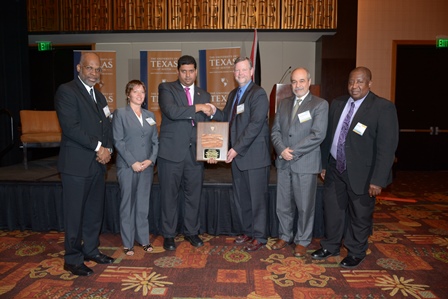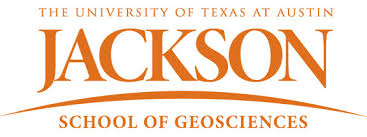

L to R; Cletus Springer, Director of the Department of Sustainable Development OAS; Pamela Tomski, Senior Fellow at the Atlantic Council’s Energy and Environment Program; The Honorable Kevin Ramnarine, Minister of Energy and Energy Affairs, Trinidad and Tobago; Dr. Terrence Quinn, Director, University of Texas at Austin Jackson School of Geosciences, Institute for Geophysics; Alejandro Melandri, Interim Head of the Energy Division of the Infrastructure and Environment Department, Inter-American Development Bank (IDB); and Selwyn Lashley, Permanent Secretary, Ministry of Energy and Energy Affairs, Trinidad and Tobago.
The Jackson School of Geosciences at the University of Texas at Austin, an ECPA strategic partner, hosted the IX edition of its Latin American Forum on Energy and the Environment. The event took place in Port of Spain, Trinidad and Tobago on March 24. The Department of Sustainable Development (DSD) of the Organization of American States (OAS), which operates the ECPA Clearinghouse, was invited to present the work conducted by ECPA and its partners to support partnerships for greater dialogue, collaboration and awareness on energy and climate.
At the event, the DSD addressed the need to strengthen the science-policy interface for sustainable energy development in the Caribbean. Additionally a discussion panel discussed opportunities to empower energy and climate research and development across Latin America and the Caribbean through greater literacy and education in applied sciences.
Kevin C. Ramnarine, Minister of Energy and Energy Affairs of Trinidad and Tobago was the forum’s keynote speaker. The Minister stressed that many post-graduate students from Trinidad and Tobago are doing valuable research at the University of Texas at Austin. Ramnarine noted that “we are to the Caribbean what Germany is to Europe”. He also commented on the draft national energy policy that will be submitted to Cabinet by the end of March. During the forum session The University of Texas announced academic and research Partnerships with the University of the West Indies (UWI) and the University of Trinidad and Tobago (UTT). These new academic partnerships will build the capacity of academic institutions in the Caribbean to study climate change phenomena.
Forum discussants stressed the need for access to reliable scientific data as a means to strengthen the energy and climate debate in the Caribbean. On this subject, Cletus Springer, Director of the Department of Sustainable Development of the Organization of American States, said that “a clear sign of the disconnect between our policy makers and those in the science and technology domain is the paucity of robust data on critical developmental phenomena.” Springer added that “available data is not sufficiently well-organized and the research by which it is generated is not sustained enough to permit a clear interpretation of trends and a sound assessment of costs and benefits of actions or inactions”. Springer, who focused his remarks on the need to strengthen the interface between policy and science and technology for sustainable development, added that “decision-making that is not informed by science-based, evidence is not likely to be sound and therefore the impact of these decisions is not likely to be positive.” “The absence of up-to-date, reliable data on critical social, economic and environmental parameters leaves us to wonder about the what, how and how of public policies that have been and are being formulated, concluded Springer.
The objective of the annual Latin American Forum on Energy and the Environment is to foster and maintain sound relationships among a diverse pool of prominent regional stakeholders that can multiply the future impact of educating students and transferring knowledge. This year’s forum featured Natural Liquid Gas as the central discussion topic.

 View Map
View Map